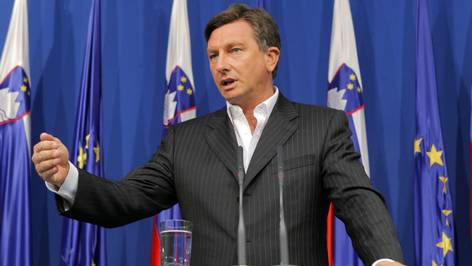NEWS
Prime Minister's press conference held after the Government’s 138th regular session
Following today's 138th regular session held by the Government, Mr Pahor first emphasised that he is still the Prime Minister and intends to remain in office until the vote of confidence, likely to be proposed during the supplementary budget adoption procedure, is taken by the National Assembly. 'In the event that the supplementary budget is not adopted, I personally advocate early elections,' said Prime Minister Pahor and expressed his wish that the current political uncertainty would be overcome without a political crisis. In his view there are two alternatives to this uncertainty. The first is the political consolidation of the coalition and the second is a political crisis. This situation could be overcome without a political crisis by 'successfully consolidating the minority Government which I lead'. This means that a compromise for potentially necessary changes in the Government should be reached within twenty days at the latest.
At today's session, the Slovenian Government also adopted a platform for preparing a draft supplementary budget for 2011, where it defined a framework breakdown of the Government's budgetary expenditure for the year. The total 2011 expenditure will be EUR 9,561 million, which is EUR 455 million below the adopted 2011 budget and EUR 281 million over the amount of the realisation of the Government's budgetary expenditure for the previous year. This means a 3 per cent rise in budget spending in comparison with 2010. By taking extreme austerity measures in 2010, the Government reduced the level of budget spending below the amount forecast by as much as EUR 1.2 billion. The austerity measures put in place for the past year were mainly in response to a serious decrease in public finance inflows in 2010. Had the spending remained equal to the 2011 budget, it would have increased by 8 per cent on last year. This is the main reason for reducing spending in relation to the planned budget by EUR 455 million. The envisaged supplementary budget pursues the objective of investing further in development turnaround, i.e. the promotion of the economy of knowledge. The supplementary budget will also aim at ensuring social security under the present adverse labour market conditions.
At today's session, the ministerial corps adopted the text of the amendment to the Intervention Measures Act which follows the principles of the sustainability of the public finances and the reasonable use of public funds, as well as the principle of legality. This means that this Act should establish an adequate relationship between the number of public employees and the funds available for wages in order to enable these and other types of income to be paid pursuant to the law, the implementing regulation and the collective agreement.
Another aim of this Act is to reduce the risk to the stability of the public finances, thereby preventing the public finance deficit from increasing further. The key issue to be tackled by fiscal policy over the forthcoming period is how to reduce the scope of public financing.




